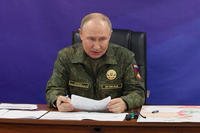Stanislaw Żaryn is the spokesman for Poland's Minister-Security and Intelligence Services Coordinator.
The opinions expressed in this op-ed are those of the author and do not necessarily reflect the views of Military.com. If you would like to submit your own commentary, please send your article to opinions@military.com for consideration.
The threats posed by Moscow and Minsk have increased sharply in the last couple of months. The actions taken by these two regimes, where the latter is obsequious to the former, take the heaviest toll on Central and Eastern Europe countries.
A hybrid operation is being waged against many countries in Europe that involves weaponized migration and information warfare. Concerns are also growing that Russia may step up its aggression against Ukraine. There is a common denominator of all these issues -- Russia's growing hostility against the West.
Poland is now the prime target of a massive influx of migrants orchestrated by the regime of Alexander Lukashenko, the Belarusian strongman who is largely dependent on Russian ruler Vladimir Putin for his grasp on power. Earlier this year, the focus of Lukashenko's hybrid operation was Lithuania and Latvia, but that focus has shifted.
In 2021, the Polish Border Guard has reported 40,000 attempts to illegally enter our country from Belarus, up from only 120 such attempts in 2020. The migratory route -- clearly an artificial one -- to the West via Belarus is transparently a creation of Belarusian services. Poland is currently dealing with "a creeping conflict."
Although the number of attempts is decreasing, groups of migrants continue to surge across our border, leading to skirmishes with Polish patrols. On every such confrontation, migrants have been shoulder to shoulder with Belarusians as they pelted our forces with stones and scattered rubble, logs, sticks and metal poles torn out from the border fencing.
As a result, a few Polish soldiers, police officers and border guards have sustained head injuries since the beginning of the crisis. It is also common for the attackers to use laser beams, strobe lights and tear gas to impede our patrols. The Belarusian services keep staging these escalatory provocations at our border.
Although it is a migratory crisis that has been planned and created by Lukashenko in a bid to destabilize not only Poland, but the entire eastern flank of NATO and the European Union, this is not about migration. Nor is it about Lukashenko himself. It is about the Kremlin's anti-West strategy. The weaponization of migrants by the regime in Minsk is just one of many elements of the Russian long-term and long-lasting plan to divide the societies and states of Central and Eastern Europe, but above all, to undermine the unity of NATO and the EU. The Kremlin would like to see them paralyzed, fallen and discredited.
Lukashenko would not have even dared to organize and conduct such a major operation against the West without the approval and support of his political patron and puppet master in the Kremlin. And it is not the government in Minsk but that in Moscow that will try and politically capitalize on the crisis created on its behalf by the Belarusian regime.
Russia has already started portraying itself as a potential conciliator and mediator. Russian "help" in mending the situation always comes with a price. The most likely price in this case would be concessions to the interests of the Kremlin. The tricky part is that the benefits Russia would draw from its "mediation" could in fact provide it with even more opportunities and a better position to destabilize Europe.
That is exactly the reason why the Russian authorities are doing their utmost to stay low-profile and remain hidden behind Lukashenko's active hand. In the official message, the Kremlin's political elites pretend that they have nothing to do with the crisis on the Belarusian-EU border. However, Russian responsibility, since the very beginning, is unquestionable.
In addition to activities aimed at destabilizing our border with Belarus, the Kremlin and Minsk conduct consistent information warfare efforts against Poland. Every day, new propaganda materials are posted or aired in Belarusian and Russian media outlets that portray Poland as being responsible for the migratory crisis. The narratives pushed by these mouthpieces falsely imply that Warsaw seeks to heighten tensions on the border, to make political gains through the crisis and routinely violates international humanitarian laws. Belarusian and Russian propagandists and top officials are actively involved in amplifying these bogus suggestions, which is a constant feature of both regimes' propaganda activities.
Poland is dealing with a border crisis complemented with a widespread disinformation and propaganda campaign. It is typical of Russia to take both informational and political actions against the countries of NATO's eastern flank. That is how the Kremlin seeks to reach its strategic goals, which include pushing the U.S. presence out of Central and Eastern Europe and permanently decreasing the level of security of the Alliance in the region.
Note that the military doctrine of Russia assumes that information warfare efforts and pushing disinformation may be used as part of military operations. Ukraine is the best proof of how Russia's information warfare activities and real, tangible military aggression are interwoven.
The mobilization of large numbers of Russian troops on the border with Ukraine is yet another point of concern. It is worth emphasizing something that may seem obvious, but is often overlooked -- that Russia invaded Ukraine in 2014 and has not stopped waging war on Ukraine ever since. Russia remains the aggressor.
It is difficult to predict in the short term whether the gathering of 90,000 Russian troops at the Ukrainian border is a prelude to yet another major attack on Ukrainian territory. This must be monitored closely and on an ongoing basis. But these movements should certainly be perceived as an element of information warfare and intimidation. Their aim is to make Kiev abandon its Euro-Atlantic aspirations and make the West forget about Ukraine. The world must keep an eye on Russia's actions and not be surprised as it was in 2014. And, if necessary, the world must work out a joint, robust response -- one that will be painful for the Kremlin.
Russia is a hostile country to the West, period. In its dealings with others, the Kremlin allows the use of hybrid methods. It will not hesitate to use military aggression and occupation. Staying hidden behind third-party actors or using proxies provides it with new possibilities to exert its hostile influence on Europe and to gain new tools.
The Kremlin's imperial policy against the West, and NATO in particular, is in full bloom. For quite a while, the shadow of Russian aggression has been looming over Central and Eastern Europe. There is nothing to indicate it is going away any time soon.















